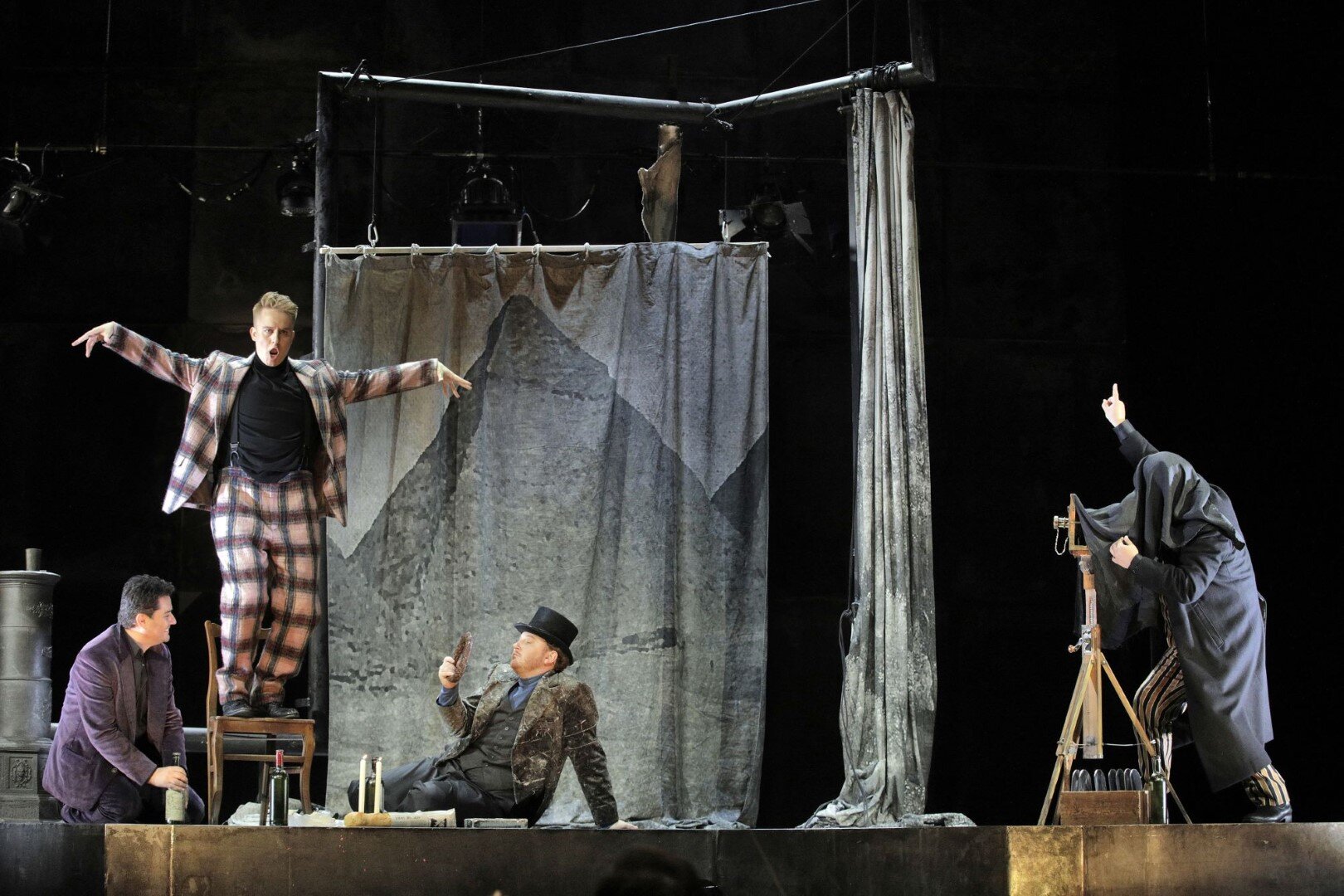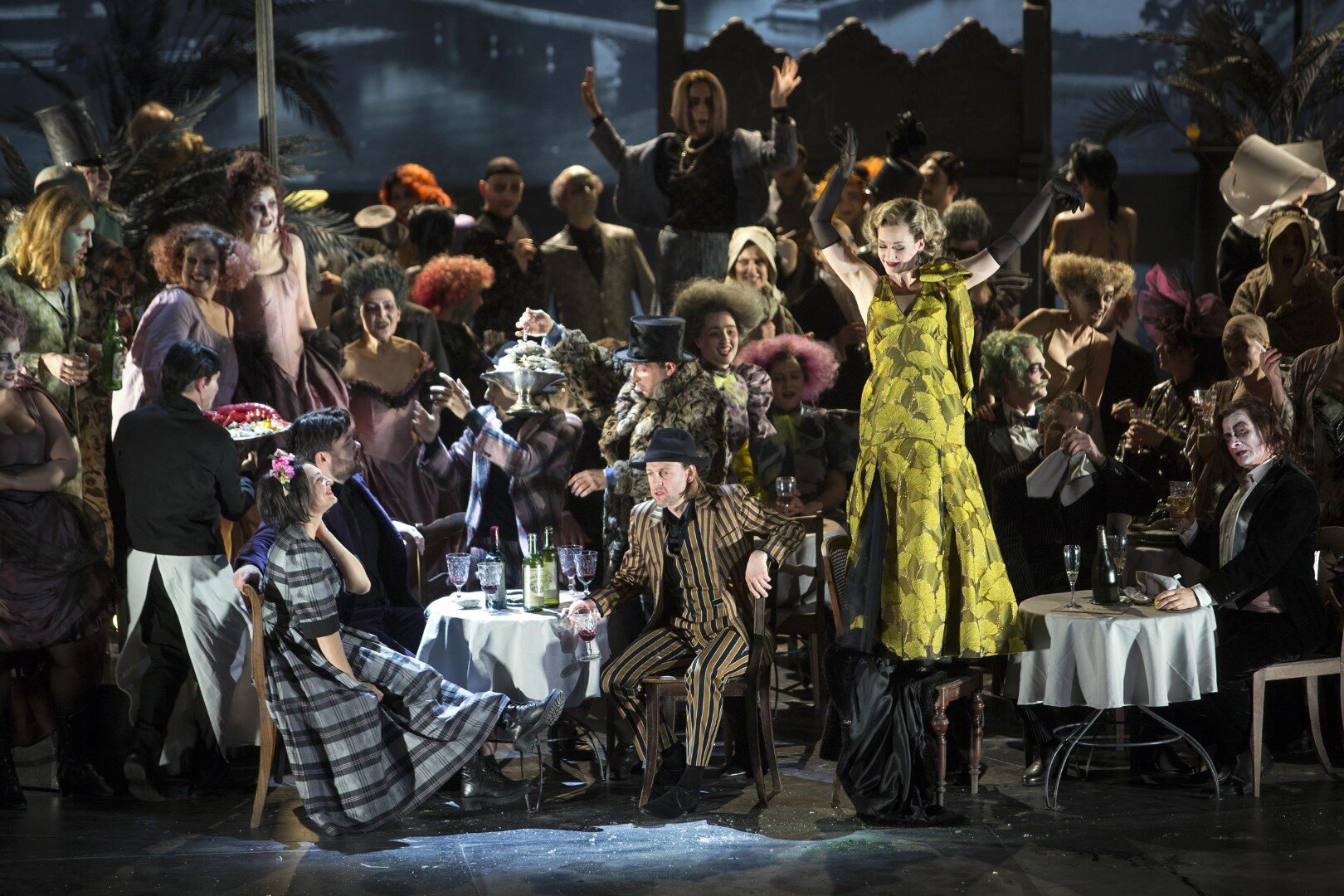Great Music and Singing Bring Life to a Morbid 'La Bohème'
/By Truman C. Wang
9/15/2019
Photo credit: Cory Weaver / LA Opera
Unlike his delightfully whimsical Magic Flute in 2016, Barrie Kosky did an about-face in his new La Bohème (first seen at Komische Oper Berlin in January). The LA Opera press release describes it as a “not-completely-traditional production keeps the opera’s original 19th-century setting with a few surprises along the way.”
I, however, shall call it “a nightmare at Café Momus on Elm Street”, given its morbid obsession with death: a dimly-lit stage, Rufus Didwiszus’ bleak sets of street scenes of Paris in old faded daguerreotypes. Victoria Behr’s costumes are heavy on plaid and garish colors, adding to the production’s nightmarish quality. And Mimi’s death in the opera’s finale is pure ghoul – you can hate it, or laugh it off as an early Halloween prank.
This ain’t no Magic Flute. Still, there is some whimsy to be found. Kosky stages the Act 2 Parisian Scene as “a state of mind – a fast-moving, excessive, surreal, joyful and tragic world.” (Again I’m quoting the press release.) It’s a world inhabited by Parpignol as a horned clown, children dressed as black Pierrots, nude prostitutes (of both sexes), burlesque dancers, nuns, housewives, and of course the young bohemians. They all swirl by in front of our eyes on the carousel of Parisian life at the Café Momus.
Faced with such ugliness and despair, naturally there are a lot of pent-up frustrations and smashing of props and breakaway glasses and bottles (in Acts 2 and 3). Kosky calls this “prop choreography” depicted in Puccini’s music. But then, in the Act 3 orchestral prelude, he adds a comic scene of a drunken Marcello photographing burlesque dancers that’s not depicted by Puccini.
Other Kosky oddities: Marcello is a photographer in this production but the translated titles continue to refer to him as “the painter”, and the role of landlord Benoit is inexplicably omitted.
Lest I sound overly critical, there are a couple of effective, almost Shakespearean, directorial touches – Rodolfo starts his aria “Che gelida manina” with only Mimi’s hand visible (like Romeo and Juliet); Marcello and Musetta embrace after cussing each other out (like Beatrice and Benedick in Much Ado About Nothing).
The LA Opera assembled a cast of bright young voices for this dark production. Saimir Pirgu and Marina Costa-Jackson show fine chemistry together as Rodolfo and Mimi. His suave tenor virile and exciting with an easy high C in “Che gelida manina”, her lyric soprano strong in the middle and gleaming in the top, together they sang a meltingly beautiful duet “O Soave Fanciulla” that ends Act 1 on a high note (literally).
The other singers are all alumni or current members of LA Opera’s Domingo-Colburn-Stein Young Artist Program. Soprano Erica Petrocelli gets to wear the prettiest costume in the show while singing Musetta’s Waltz, brilliantly. Baritone Kihun Yoon’s Marcello, Bass-baritone Nicholas Brownlee’s Colline and baritone Michael J. Hawk’s Schaunard all acquit themselves well, although I yearn to hear a genuine bass in Colline’s famous coat aria.
Conducting his 194th Bohème on this opening night (September 14), James Conlon played Puccini like it’s a Mahler symphony – with oodles of sumptuous strings and beguiling woodwinds. The reviews of the opera’s 1898 Turin premiere complained about Puccini’s “symphonic music”. Here maestro Conlon revels in it, whipping up some truly opulent sounds that carry the voices to soaring heights.
Puccini was worth $200 million (in today’s money) when he died in 1924. Such great wealth and popularity naturally attracted cynicism among his detractors. Mahler hated him. My UC Berkeley professor, Joseph Kerman, called Tosca a "shabby little shocker". Today, however, most critics would agree with Anthony Tommasini in his new book The Indispensable Composers, that Puccini is "one of the most dramatically astute and musically expert composers to write for the stage" (a sentiment also echoed by director Barrie Kosky).
Come for the great music, some good singing, and a bit of ghoulish humor.
Five more performances on September 22, 25, 28 and October 2, 6. The 9/28 performance will be simulcast to screens in Columbia Regional Park in Torrance and the Santa Monica Pier.
Truman C. Wang is Editor-in-Chief of Classical Voice, whose articles have appeared in the Pasadena Star-News, San Gabriel Valley Tribune, other Southern California publications, as well as the Hawaiian Chinese Daily. He studied Integrative Biology and Music at U.C. Berkeley.






